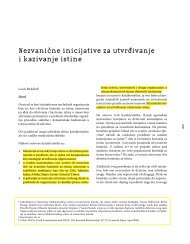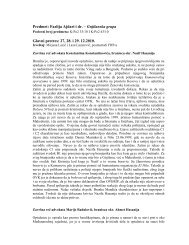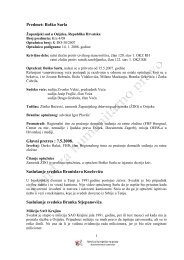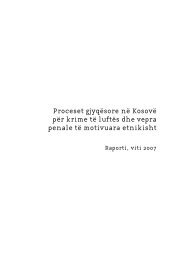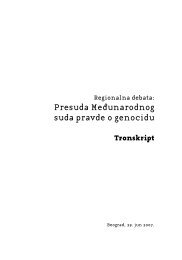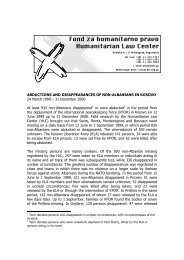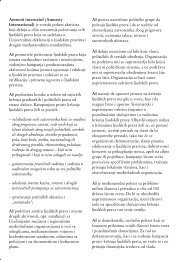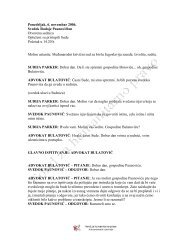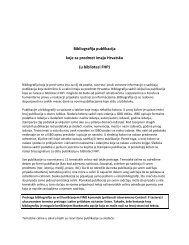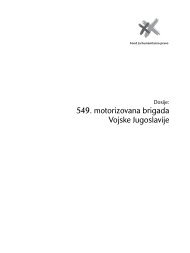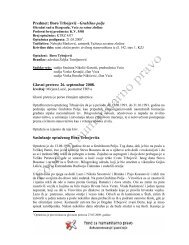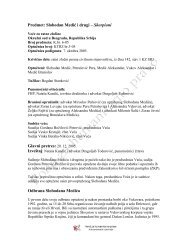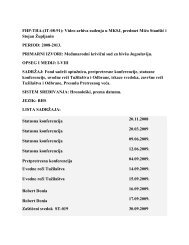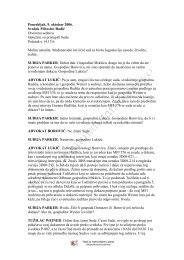here - Humanitarian Law Center/Fond za humanitarno pravo
here - Humanitarian Law Center/Fond za humanitarno pravo
here - Humanitarian Law Center/Fond za humanitarno pravo
Create successful ePaper yourself
Turn your PDF publications into a flip-book with our unique Google optimized e-Paper software.
The court also found that the defendants Vukšić, Strigić and Hrnjak, on 17 October 1991,<br />
pursuant to a previous agreement between Vukšić and Zoran Madžarac, killed four Croatian<br />
civilians, members of the Čičak family 156 . The defendants transported the Čičaks in a Black<br />
Maria to the ‘Karaševo’ farmhouse. First they took Mate Čičak from the van, after which Vukšić<br />
stabbed him in the neck and then killed him with a shot to the head from a Colt handgun. After<br />
that, Ivan, Vinko and Ante were taken out of the van and killed by Vukšić with shots to the head<br />
and torso. The accused Strigić fired at Ante’s dead body with his automatic weapon.<br />
Stating the reasons for the judgment, the presiding judge said, among other things, that the<br />
responsibility for this crime lay not only with the accused but also with their superior officers<br />
who were aware of the crime and knew who the perpetrators were but failed to prosecute any of<br />
them. The murder of the Čičaks would not have happened, said the court, had Vukšić been<br />
arrested for some earlier crimes against Croatian Civilians that his superior officers knew of.<br />
Analysis of proceedings<br />
The HLC cannot analyze the judgment pronounced on 19 June 2012, because of the Higher<br />
Court’s practice of denying access to non-final judgments delivered by this court. 157 However,<br />
the proceedings which resulted in this judgment were free from substantial violations of CPC<br />
provisions that could have affected the legality and properness of the judgment rendered.<br />
With regard to penalties, i.e. the length of prison sentences imposed, each deserves a separate<br />
comment. For example, 20 years’ prison sentence imposed on Zoran Vukšić, as the maximum<br />
penalty prescribed for such an offence, is appropriate given the number of criminal acts he<br />
committed, his conduct and mental attitude towards the crime. On the other hand, the penalty<br />
imposed on Velimir Bertić does not correspond with the crimes he is charged with. Imposing<br />
prison sentences below the statutory minimum in war crimes trials is unacceptable, regardless of<br />
the age of a perpetrator at the time of the commission of a criminal offence. Given all the<br />
aggravating circumstances present, the position that t<strong>here</strong> existed circumstances that justify such<br />
a lenient penalty is untenable. Despite his very young age (21) at the time of the crime, and the<br />
fact that he did not take part in the killing of civilians, Bertić showed determination and<br />
ruthlessness in the commission of his crime. Such a light penalty for this type of crime will not<br />
help establish a value system that could prevent similar crimes from re-occurring.<br />
A remark given by the presiding judge during the pronunciation of judgment about the<br />
responsibility of the superior officers of the accused deserves special attention. The court<br />
established that the said superior officers were aware of the crimes and knew who the<br />
perpetrators were but failed to prosecute them. The court emphasized that the murder of Čičak<br />
family members would not have happened had Vukšić been arrested by his commanding officers<br />
before. Testimonies by Vukšić’s superiors - Radoslav Zdjelarević, head of the SUP in Beli<br />
156 Vinko, Mate, Ivan and Ante Čičak.<br />
157 For more details regarding this TRZ practice, see page 13.<br />
69




